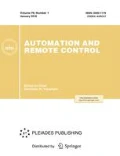Abstract
A multiserver queueing system with finite buffer, Markov input flow, and Markov (general) service process of all customers on servers with the number of process states and intensities of inter-phase transitions depending on the number of customers in the system is considered. A Markov flow of negative customers arrives to the system; one negative customer “kills” one positive customer at the end of the queue. A recurrent algorithm for computing stationary probabilities of system states is obtained; and a method for calculating stationary distribution of waiting time before starting service of a positive customer is proposed.
Similar content being viewed by others
References
Gelenbe, E., Random Neural Networks with Positive and Negative Signals and Product Form Solution, Neur. Comput., 1989, vol. 1, pp. 502–510.
Gelenbe, E., Reseaux Neuronaux Aleatoires Stables, Comptes-Rendus Acad. Sci. II, 1990, vol. 310, pp. 177–180.
Gelenbe, E. and Pujolle, G., Introduction to Queueing Networks, New York: Wiley, 1998.
Artalejo, J.R., G-networks: A Versatile Approach for Work Removal in Queueing Networks, Eur. J. Oper. Res., 2000, vol. 126, pp. 233–249.
Bocharov, P.P. and Vishnevskii, V.M., G-Networks: Development of the Theory of Multiplicative Networks, Avtom. Telemekh., 2003, no. 5, pp. 46–74.
Baskett, F., Chandy, K.M., Muntz, R.R., et al., Open, Closed, and Mixed Networks of Queues with Different Classes of Customers, J. ACM, 1975, vol. 22, pp. 248–260.
Shin, Y., Multiserver Retrial Queue with Negative Customers and Disasters, Proc. of the Fifth Internat. Workshop on Retrial Queues, Seoul: Korea Univ., 2005, pp. 53–60.
Anisimov, V. and Artalejo, J., Analysis of Markov Multiserver Retrial Queues with Negative Arrivals, Queueing Syst., 2001, vol. 39, pp. 157–182.
Chaplygin, V.V., Stationary Characteristics of the G/MSP/n/r Queueing System with the Flow of Negative Customers, Inform. Processes, 2005, vol. 5, no. 1, pp. 1–19.
Bocharov, P.P., d’Apice, C., Manzo, R., and Pechinkin, A.V., Analysis of the Multiserver Markov Queueing System with Unlimited Buffer and Negative Customers, Avtom. Telemekh., 2007, no. 1, pp. 93–104.
Bocharov, P.P. and Pechinkin, A.V., Teoriya massovogo obsluzhivaniya (Queueing Theory), Moscow: Ross. Univ. Druzhby Narodov, 1995.
Pechinkin, A.V. and Chaplygin, V.V., Stationary Characteristics of the SM/MSP/n/r Queueing System, Avtom. Telemekh., 2004, no. 9, pp. 85–100.
Author information
Authors and Affiliations
Additional information
Original Russian Text © A.V. Pechinkin, 2007, published in Informatsionnye Protsessy, 2007, Vol. 7, No. 2, pp. 138–152.
This work was supported by the Russian Foundation for Basic Research, projects nos. 06-07-89056 and 05-07-90103.
Rights and permissions
About this article
Cite this article
Pechinkin, A.V. Markov queueing system with finite buffer and negative customers affecting the queue end. Autom Remote Control 68, 1104–1117 (2007). https://doi.org/10.1134/S0005117907060173
Received:
Issue Date:
DOI: https://doi.org/10.1134/S0005117907060173




